- Home
- Ernest Hemingway
The Garden of Eden Page 2
The Garden of Eden Read online
Page 2
"Must I stop?" the girl asked. "I'm having the most wonderful dream." "Finish the dream," he said. "Thank you." In a few minutes she breathed very deeply and shook her head and sat up. "Let's go in now," she said. They went in together and swam out and then played under water like porpoises. When they swam in they dried each other off with towels and he handed her the bottle of wine that was still cool in the rolled newspaper and they each took a drink and she looked at him and laughed. "It's nice to drink it for thirst," she said. "You don't really mind being brothers do you?" "No." He touched her forehead and her nose and then her cheeks and chin with the oil and then put it carefully above and behind her ears. "I want to get behind my ears and neck tanned and over my cheekbones. All the new places." "You're awfully dark, brother," he said. "You don't know how dark." "I like it," the girl said. "But I want to be darker." They lay on the beach on the firm sand that was dry now but still cool after the high tide had fallen. The young man put some oil on the palm of his hand and spread it lightly with his fingers over the girl's thighs and they glowed warm as the skin took the oil. He went on spreading it over her belly and breasts and the girl said sleepily, "We don't look very much like brothers when we're this way do we?" "No." "I'm trying to be such a very good girl," she said. "Truly you don't have to worry darling until night. We won't let the night things come in the day." At the hotel the postman was having a drink while he waited for the girl to sign for a large forwarding envelope heavy with enclosed letters from her bank in Paris. There were three letters re-addressed from his bank, too. It was the first mail since they had sent the hotel as a forwarding address. The young man gave the postman five francs and asked him to have another glass of wine with him at the zinc bar. The girl unhooked the key from the board and said, "I'll go up to the room and get cleaned up and meet you at the cafe." After he finished his glass he said goodbye to the postman and walked down along the canal to the cafe. It was good to sit in the shade after walking back bareheaded in the sun from the far beach and it was pleasant and cool in the cafe. He ordered a vermouth and soda and took out his pocket knife and slit open his letters. All three envelopes were from his publishers and two of them were fat with clippings and the proofs of advertisements. He glanced at the clippings and then read the long letter. It was cheerful and guardedly optimistic. It was too early to tell how the book would do but everything looked good. Most of the reviews were excellent. Of course there were some. But that was to be expected. Sentences had been underlined in the reviews that would probably be used in the future advertisements. His publisher wished he could say more about how the book would do but he never made predictions as to sales. It was bad practice. The point was that the book could not have been better received. The reception was sensational really. But he would see the clippings. The first printing had been five thousand copies and on the strength of the reviews a second printing had been ordered. The upcoming advertisements would carry the phrase Now in Its Second Printing. His publisher hoped that he was as happy as he deserved to be and taking the rest that he so richly deserved. He sent his best greetings to his wife. The young man borrowed a pencil from the waiter and com menced to multiply $2.50 by one thousand. That was easy. Ten percent of that was two hundred and fifty dollars. Five times that was twelve hundred and fifty dollars. Deduct seven hundred and fifty dollars for the advance. That left five hundred dollars earned by the first printing. Now there was the second printing. Say that was two thousand. That was twelve and a half percent of five thousand dollars. If that was how the contract was. That would be six hundred and twenty-five dollars. But maybe it did not go up to twelve and a half percent until ten thousand. Well it was still five hundred dollars. That would still leave a thousand. He started to read the reviews and found that he had drunk the vermouth without ever noticing it. He ordered another and returned the pencil to the waiter. He was still reading the reviews when the girl came in bringing her heavy envelope of letters. "I didn't know they'd come," she said. "Let me see them. Please let me see them." The waiter brought her a vermouth and putting it down saw the picture as the girl unfolded a clipping. "C'est Monsieur?" he asked. "Yes it is," the girl said and held it up for him to see. "But differently dressed," the waiter said. "Do they write about the marriage? May I see a picture of Madame?" "Not about the marriage. Criticisms of a book by Monsieur." "Magnificent," said the waiter who was deeply moved. "Is Madame also a writer?" "No," the girl said not looking up from the clippings. "Madame is a housewife." The waiter laughed proudly. "Madame is probably in the cinema." They both read clippings and then the girl put the one she was reading down and said, "I'm frightened by them and all the things they say. How can we be us and have the things we have and do what we do and you be this that's in the clippings?" "I've had them before," the young man said. "They're bad for you but it doesn't last." "They're terrible," she said. "They could destroy you if you thought about them or believed them. You don't think I married you because you are what they say you are in these clippings do you?" "No. I want to read them and then we'll seal them up in the envelope." "I know you have to read them. I don't want to be stupid about them. But even in an envelope it's awful to have them with us. It's like bringing along somebody's ashes in a jar." "Plenty of people would be happy if their damned husbands had good reviews." "I'm not plenty of people and you're not my damned husband. Please let's not fight." "We won't. You read them and if there's anything good you tell me and if they say anything about the book that's intelligent that we don't know you tell me. The book's made some money already," he told her. "That's wonderful. I'm so glad. But we know it's good. If the reviews had said it was worthless and it never made a cent I would have been just as proud and just as happy." I wouldn't, the young man thought. But he did not say it. He went on reading the reviews, unfolding them and folding them up again and putting them back in the envelope. The girl sat opening envelopes and reading her letters without interest. Then she looked out of the cafe at the sea. Her face was a dark gold brown and she had brushed her hair straight back from her forehead the way the sea had pulled it when she had come out of the water and where it was cropped close and on her cheeks the sun had burned it to white gold against the brown of her skin. She looked out at the sea and her eyes were very sad. Then she went back to opening letters. There was one long typewritten one that she read with concentration. Then she went on opening and reading the other letters. The young man looked at her and thought she looked a little as though she were shelling peas. "What was in the letters?" the young man asked. "There were checks in some." "Big ones?" "Two." "That's fine," he said. "Don't go away like that. You always said it never made any difference." "Have I said anything?" "No. You just went away. "I'm sorry," he said. "How big are they?" "Not much really. But good for us. They've been deposited. It's because I'm married. I told you it was the best thing for us to be married. I know it doesn't mean anything as capital but this is spendable. We can spend it and it doesn't hurt anybody and it's for that. It doesn't have anything to do with regular income nor what I get if I live to be twenty-five or if I ever live to be thirty. This is ours for anything we want to do. Neither of us will have to worry about balances for a while. It's that simple." "The book has paid back the advance and made about a thousand dollars," he said.
"Isn't that awfully good when it's only just come out?" "It's all right. Should we have another one of these?" he asked. "Let's drink something else." "How much vermouth did you drink?" "Only the one. I must say it was dull." "I drank two and didn't even taste them." "What is there that's real?" she said. "Did you ever drink Armagnac and soda? That's real enough." "Good. Let's try that." The waiter brought the Armagnac and the young man told him to bring a cold bottle of Perrier water instead of the syphon. The waiter poured two large Armagnacs and the young man put ice in the big glasses and poured in the Perrier. "This will fix us," he said. "It's a hell of a thing to drink before lunch though." The girl took a long sip. "It's good," she said. "It has a fresh clean healthy ugly taste." She took
another long sip. "I can really feel it. Can you?" "Yes," he said and took a deep breath. "I can feel it." She drank from the glass again and smiled and the laugh wrinkles came at the corner of her eyes. The cold Perrier had made the heavy brandy alive. "For heroes," he said. "I don't mind being a hero," she said. "We're not like other people. We don't have to call each other darling or my dear or my love nor any of that to make a point. Darling and my dearest and my very dearest and all that are obscene to me and we call each other by our Christian names. You know what I'm trying to say. Why do we have to do other things like everyone does?" "You're a very intelligent girl." "All right Davie," she said. "Why do we have to be stuffy? Why don't we keep on and travel now when it can never be more fun? We'll do everything you want. If you'd been a European with a lawyer my money would have been yours any way. It is yours." "The hell with it." "All right. The hell with it. But we'll spend it and I think it's wonderful. You can write afterwards. That way we can have the fun before I have a baby for one thing. How do I know when I'll have a baby even? Now it's all getting dull and dusty talking about it. Can't we just do it and not talk about it?" "What if I want to write? The minute you're not going to do something it will probably make you want to do it." "Then write, stupid. You didn't say you wouldn't write. Nobody said anything about worrying if you wrote. Did they?" But somewhere something had been said and now he could not remember it because he had been thinking ahead. "If you want to write go ahead and I'll amuse myself. I don't have to leave you when you write do I?" "But where would you like us to go now when people begin to come here?" "Anywhere you want to go. Will you do it, David?" "For how long?" "For as long as we want. Six months. Nine months. A year." "All right," he said. "Really?" "Sure. "You're awfully good. If I didn't love you for anything else I'd love you for decisions." "They're easy to make when you haven't seen how too many of them can turn out." He drank the hero drink but it did not taste so good and he ordered a fresh bottle of cold Perrier and made a short drink without ice. "Make me one please. Short like yours. And then let's let it start and have lunch." Chapter Three THAT NIGHT IN BED when they were still awake she said in the dark, "We don't always have to do the devil things either. Please know that." "I know." "I love it the way we were before and I'm always your girl. Don't ever be lonely. You know that. I'm how you want but I'm how I want too and it isn't as though it wasn't for us both. You don't have to talk. I'm only telling a story to put you to sleep because you're my good lovely husband and my brother too. I love you and when we go to Africa I'll be your African girl too." "Are we going to Africa?" "Aren't we? Don't you remember? That was what it was about today. So we could go there or anywhere. Isn't that where we're going?" "Why didn't you say it?" "I didn't want to interfere. I said wherever you wanted. I'd go anywhere. But I thought that was where you wanted." "It's too early to go to Africa now. It's the big rains and after wards the grass is too high and it's very cold." "We could go to bed and keep warm and hear the rain on a tin roof." "No, it's too early. The roads turn to mud and you can't get around and everything is like a swamp and the grass gets so tall you cans t see. "Then where should we go?" "We can go to Spain but Sevilla is over and so is San Isidro in Madrid and it's early for there too. It's too early for the Basque coast. It's still cold and rainy. It rains everywhere there now." "Isn't there a hot part where we could swim the way we do here?" 'You can't swim in Spain the way we do here. You'd get arrested." "What a bore. Let's wait to go there then because I want us to get darker." "Why do you want to be so dark?" "I don't know. Why do you want anything? Right now it's the thing that I want most. That we don't have I mean. Doesn't it make you excited to have me getting so dark?" "Uh-huh. I love it. "Did you think I could ever be this dark?" "No, because you're blond." "I can because I'm lion color and they can go dark. But I want every part of me dark and it's getting that way and you'll be darker than an Indian and that takes us further away from other people. You see why it's important." "What will we be?" "I don't know. Maybe we'll just be us. Only changed. That's maybe the best thing. And we will keep on won't we?" "Sure. We can go over by the Est6rel and explore and find another place the way we found this one. "We can do that. There are lots of wild places and nobody is there in the summer. We could get a car and then we could go everywhere. Spain too when we want. Once we're really dark it won't be hard to keep unless we had to live in towns. We don't want to be in towns in the summer. "How dark are you going to get?" "As dark as I can. We'll have to see. I wish I had some Indian blood. I'm going to be so dark you won't be able to stand it. I can't wait to go up on the beach tomorrow." She went to sleep that way with her head back and her chin up as though she were in the sun on the beach, breathing softly, and then she curled toward him on her side and the young man lay awake and thought about the day. It is very possible that I couldn't get started, he thought, and it probably is sound to not think about it at all and just enjoy what we have. When I have to work I will. Nothing can stop that. The last book is good and I must make a better one now. This nonsense that we do is fun although I don't know how much of it is nonsense and how much is serious. Drinking brandy at noon is no damn good and already the simple aperitifs mean nothing. That is not a good sign. She changes from a girl into a boy and ba{ck to a girl care lessly and happily. She sleeps easily and beautifully and you will sleep too because all you truly know is that you feel good. You did not sell anything for the money, he thought. Everything she said about the money was true. Actually it all was true. Everything was free for a time. What was it that she had said about destruction? He could not remember that. She'd said it but he could not remember it. Then he was tired of trying to remember and he looked at the girl and kissed her cheek very lightly and she did not wake. He loved her very much and everything about her and he went to sleep thinking about her cheek against his lips and how the next day they would both be darker from the sun and how dark can she become, he thought, and how dark will she ever really be?

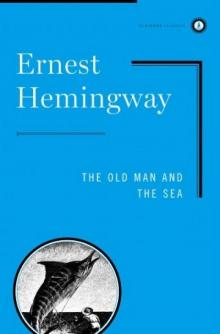 The Old Man and the Sea
The Old Man and the Sea Green Hills of Africa
Green Hills of Africa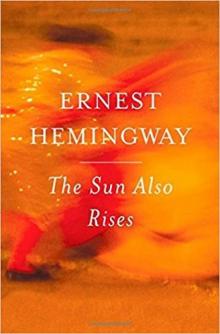 The Sun Also Rises
The Sun Also Rises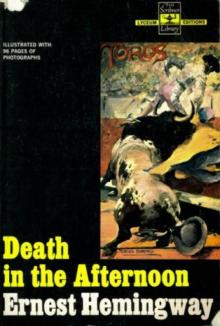 Death in the Afternoon
Death in the Afternoon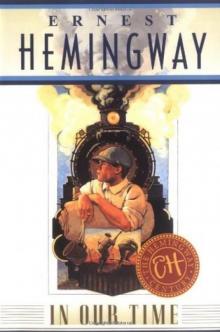 In Our Time
In Our Time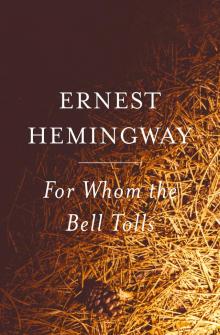 For Whom the Bell Tolls
For Whom the Bell Tolls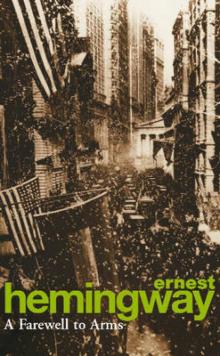 A Farewell to Arms
A Farewell to Arms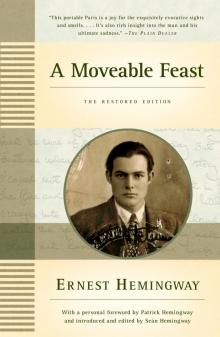 A Moveable Feast
A Moveable Feast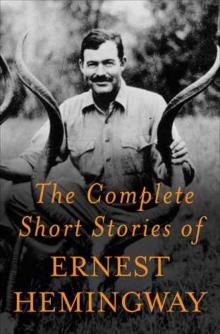 The Complete Short Stories of Ernest Hemingway
The Complete Short Stories of Ernest Hemingway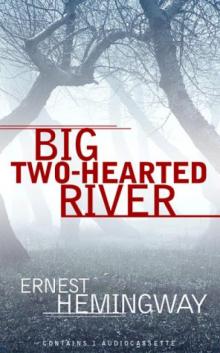 Big Two-Hearted River
Big Two-Hearted River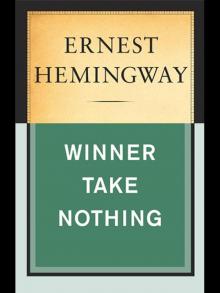 Winner Take Nothing
Winner Take Nothing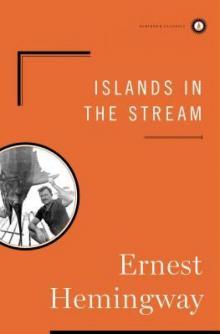 Islands in the Stream
Islands in the Stream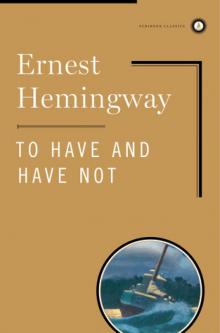 To Have and Have Not
To Have and Have Not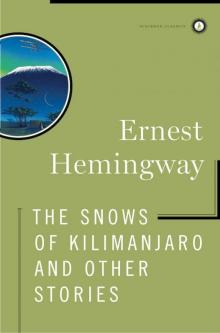 The Snows of Kilimanjaro and Other Stories
The Snows of Kilimanjaro and Other Stories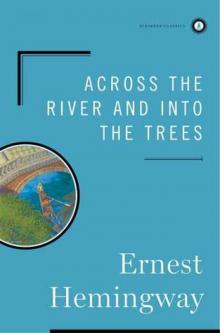 Across the River and Into the Trees
Across the River and Into the Trees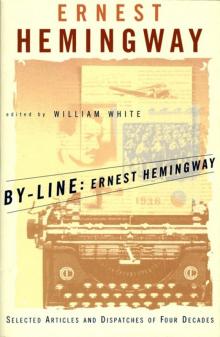 By-Line Ernest Hemingway
By-Line Ernest Hemingway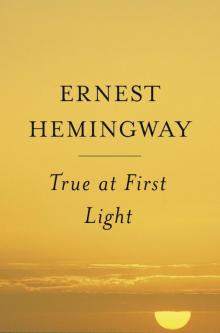 True at First Light
True at First Light Men Without Women
Men Without Women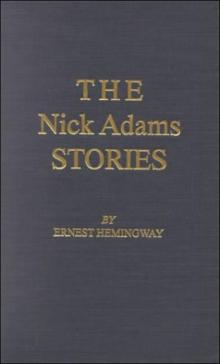 The Nick Adams Stories
The Nick Adams Stories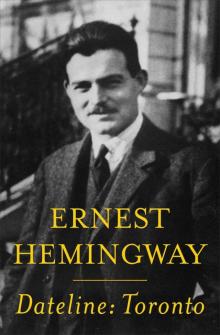 Dateline- Toronto
Dateline- Toronto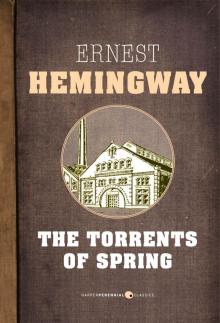 The Torrents of Spring
The Torrents of Spring Short Stories
Short Stories